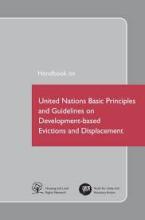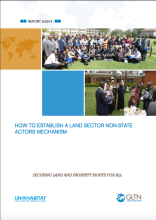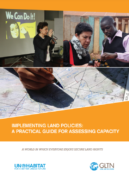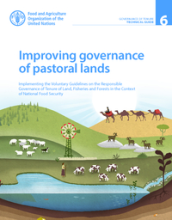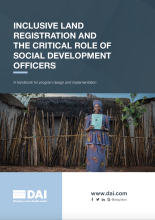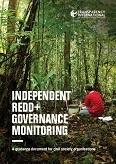Resources for Civil society
Handbook on United Nations Basic Principles and Guidelines on Development-based Evictions and Displacement
This Handbook provides a summary and the actual text of the United Nations (UN) Basic Principles and Guidelines on Development-based Evictions and Displacement, acknowledged by the UN Human Rights Council in December 2007. A first short section focuses on India before looking at the international context.
Housing and Land Rights Network Toolkit
This toolkit provides an overview of the main international legal basis and popular claims that ground the human right to adequate housing. It comes with a checklist to compare these international texts with national states' engagements and practices.
How to Deal with Projects that Involve Forced Evictions and Displacement
This guide summarizes international human rights standards applicable to involuntary displacement caused by public and private infrastructure and urbanization projects. It provides guidance for all involved parties: urban planners and architects, public authorities, the legal community, national or international financing entities, governments, civil society, and affected populations. It aims to provide guidance to assist in the execution of development projects that respect, protect and fulfil the human right to adequate housing of the communities that will be affected by them.
How to Establish a Land Sector Non-State Actors Mechanism
This guide outlines the factors that influence the set up and effective operation of a non-state actor mechanism in the land sector, particularly during a land reform process. A land sector non-state actor mechanism is a means by which a group of non-state actors (civil society, grassroots organisations, etc.) coordinates their interventions and support to enhance their impact in the land sector, particularly during land reform processes.
Implementing Land Policies: A Practical Guide for Assessing Capacity
A lack of capacity in the land management and administration is a key reason that land policies are not effectively implemented in many countries and, indeed, is a reason that those policies are inappropriate or become outdated. This Guide outlines a process for assessing the capacity of the land management and administration system in a country as a whole, or just part of it (for example, just the land-valuation system, or the land management and administration system of a particular local authority). The approach is flexible and can be adjusted to the situation and the resources available. The primary output of the assessment is a set of recommendations for planning measures to develop the capacity of the system.
Improving Governance of Forest Tenure. A Practical Guide
This guide proposes tools and approaches to improve forest tenure governance and practical actions to realise this objective. It is intended for government policy-makers, or other public sector, private sector or civil society stakeholders concerned with forest governance and tenure reform.
Improving governance of pastoral lands - Implementing the Voluntary Guidelines on the Responsible Governance of Tenure of Land, Fisheries and Forests in the Context of National Food Security
The technical guide on improving the governance of pastoral lands is designed for several audiences including government and non-government actors. It covers specific challenges of pastoral tenure that are unique to pastoralism and considers how these different facets of pastoralist tenure (issues of the commons; free, prior and informed consent (FPIC); gender etc.) can be combined in a coherent approach to securing pastoral lands.
Improving transparency and accountability in the flow of benefits to mining communities
This report seeks to investigate and propose mechanisms that can be used to improve the flow of benefits to mining-affected communities. The report sets out what requirements should be met for a community trust (or similar legal vehicle) to offer protection of trust assets. It sets out recommendations on the manner in which the legal document should be crafted to protect communities, and proposes that the time is ripe for regulation and clarity. Although it is focused on South Africa, it will be relevant for countries facing similar challenges in the mining and other commercial sectors.
Inclusive Land Registration and the Critical Role of Social Development Officers
This guide identifies lessons learned and outlines critical steps that countries can apply to their own rural land administration programs as they strive to ensure these programs become more gender and socially inclusive. The document provides a valuable learning resource to help governments and communities implement inclusive land programs.
Independent Redd+ Governance Monitoring: A Guidance Document For Civil Society Organisations
This guidance document is an overview of key steps and considerations for the design and implementation of effective independent REDD+ governance monitoring systems. It draws on a growing body of experiences and case studies undertaken by CSOs within and outside the Transparency International movement, and across different tropical forest countries.


